Choosing The Right Countertop
1. Natural-Stone Kitchen Countertops
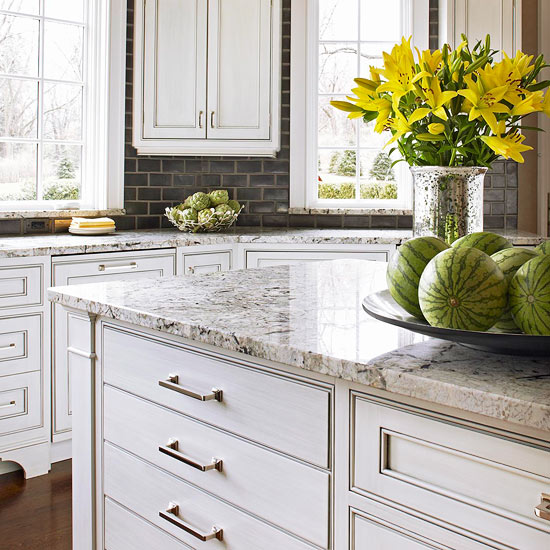 Stone is a durable material that stands up to the tough wear of an active kitchen. Stone’s natural variations in colors and textures make each countertop unique. The most popular stones are granite and marble, but limestone and soapstone are also commonly used.
Stone is a durable material that stands up to the tough wear of an active kitchen. Stone’s natural variations in colors and textures make each countertop unique. The most popular stones are granite and marble, but limestone and soapstone are also commonly used.
Pros:
– Durable and long-lasting
– Classic material that does not go out of style
– Heat-resistant
Cons:
– Naturally porous and therefore needs to be sealed when installed
– Requires regular maintenance and resealing for food safety and aesthetic upkeep
– Softer stones, such as marble or limestone, might be chipped or cracked
– Most expensive countertop material
2. Cultured-Stone Kitchen Countertops
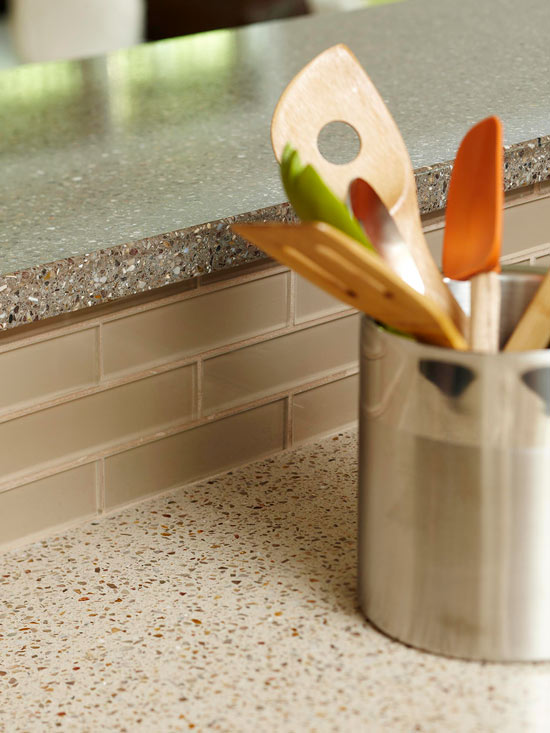 Cultured-stone countertops, also known as quartz-surfacing, are a blend of quartz and pigments that have the look and feel of natural stone. These surfaces come in a variety of colours, textures, and graining, and unlike natural stone, it’s available in uniform colors and patterns.
Cultured-stone countertops, also known as quartz-surfacing, are a blend of quartz and pigments that have the look and feel of natural stone. These surfaces come in a variety of colours, textures, and graining, and unlike natural stone, it’s available in uniform colors and patterns.
Pros:
– Heat, stain, and scratch-resistant
– Easy to clean
– Does not require sealing or special care
Cons:
– Not as natural-looking as real stone
– Costs almost as much as real stone
3. Solid-Surfacing Countertops
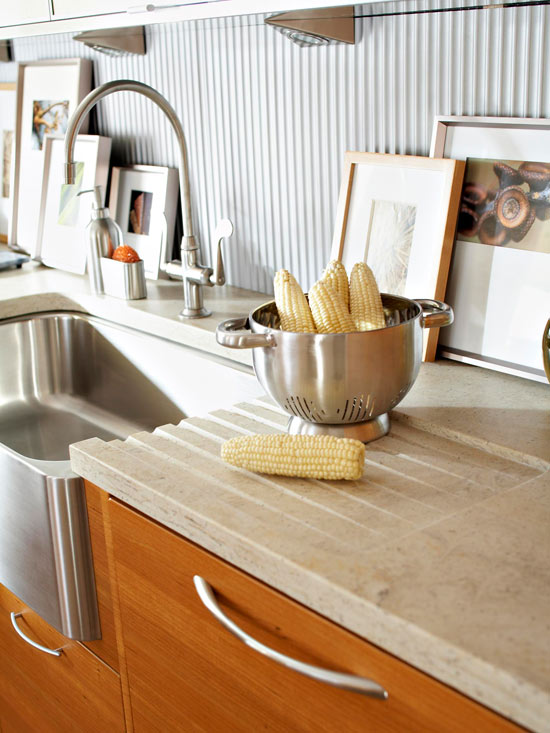 Solid-surfacing countertops mimic the look of natural stone but without the cost or required maintenance. Solid-surfacing offers a variety of colour possibilities and design options and can also resemble glass or concrete countertops.
Solid-surfacing countertops mimic the look of natural stone but without the cost or required maintenance. Solid-surfacing offers a variety of colour possibilities and design options and can also resemble glass or concrete countertops.
Pros:
– Heat and moisture-resistant
– Does not fade or age with time
– Easy to clean
Cons:
– Can be scorched
– Not scratchproof; deep cuts or scratches might require special care
4. Laminate Kitchen Countertops
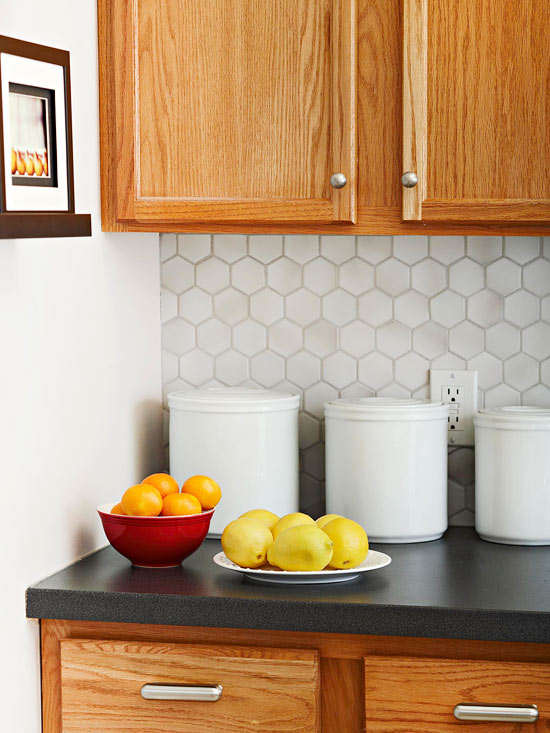 Laminate is constructed with a thin sheet of plastic resin covering plywood or particleboard. Advancements in printing technology and edge options allow laminate to mimic stone, metal, or wood countertops without the cost of natural materials.
Laminate is constructed with a thin sheet of plastic resin covering plywood or particleboard. Advancements in printing technology and edge options allow laminate to mimic stone, metal, or wood countertops without the cost of natural materials.
Pros:
– Heat, stain, and scratch-resistant
– Easy to clean
– Lower costs than all other countertop materials
Cons:
– Sharp knives and hot pans can damage laminate
– Scorching, deep scratches, and cracks cannot be repaired
– Allows only drop-in sinks due to its construction
5. Eco-Friendly Kitchen Countertops
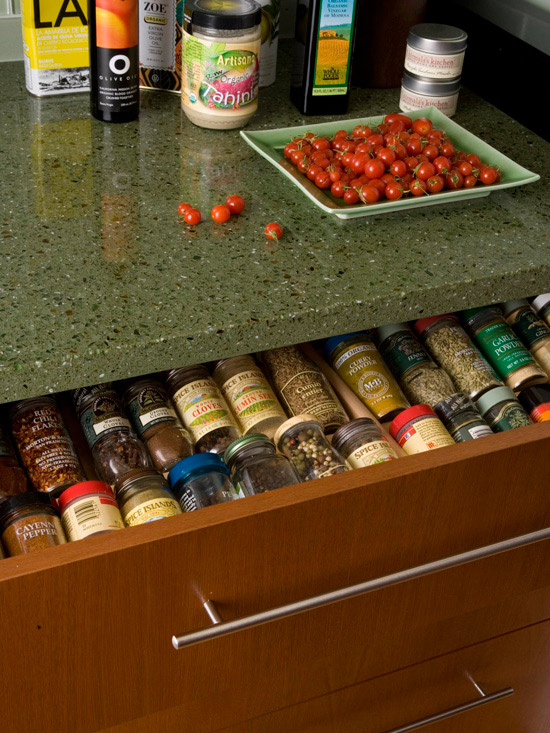 Bamboo, recycled glass, and paper composites (combination of resin, pigments, and recycled paper) are eco-friendly countertop materials. Eco-friendly countertop materials might be harder to find in some areas.
Bamboo, recycled glass, and paper composites (combination of resin, pigments, and recycled paper) are eco-friendly countertop materials. Eco-friendly countertop materials might be harder to find in some areas.
Pros:
– Bamboo: easy to clean
– Recycled glass: durable, heat- and stain-resistant, easy to clean
– Paper composite: durable, easy to clean
Cons:
– Bamboo: needs to be sealed & routinely treated, susceptible to scratches & burning
– Recycled glass: can chip, scratch, or break with heavy impacts
– Paper composite: susceptible to scratches and stains
6. Wood Kitchen Countertops
 Wood countertops add instant warmth and charm to your kitchen. Butcher block is the most common type of wood countertop, but crafted wood slabs are also available. Wood is a great prep-area countertop material.
Wood countertops add instant warmth and charm to your kitchen. Butcher block is the most common type of wood countertop, but crafted wood slabs are also available. Wood is a great prep-area countertop material.
Pros:
– Withstands cutting and chopping without dulling knives
– Long-lasting, timeless material that wears with use for a charming patina
Cons:
– Vulnerable to moisture, heat, acid, corrosive chemicals, and stains
– Shrinks or expands with extreme dryness or moisture
– Requires food-friendly sealing and routine maintenance
7. Metal Kitchen Countertops
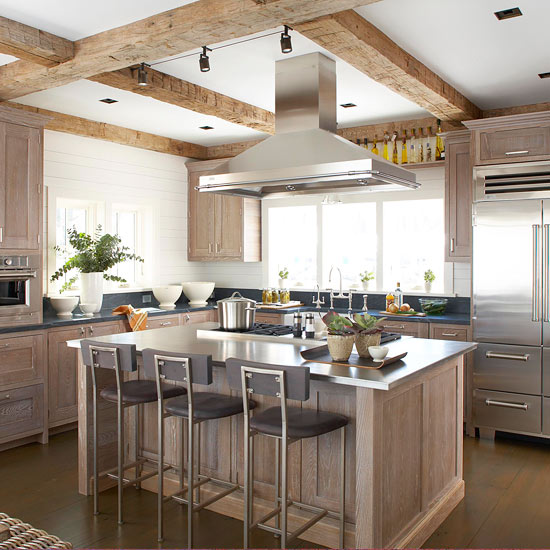 Stainless steel countertops can be found in any kitchen style, from modern to traditional, because they complement many kitchen appliances. Other metal countertop materials include copper, pewter, and zinc, but those are more style-specific.
Stainless steel countertops can be found in any kitchen style, from modern to traditional, because they complement many kitchen appliances. Other metal countertop materials include copper, pewter, and zinc, but those are more style-specific.
Pros:
– Antibacterial
– Stain and heat-resistant
– Durable
Cons:
– Copper, pewter, and zinc are susceptible to scratches and dents
– If stainless steel is scratched or dented, it’s possible it cannot be repaired
– Can be expensive
8. Concrete Kitchen Countertops
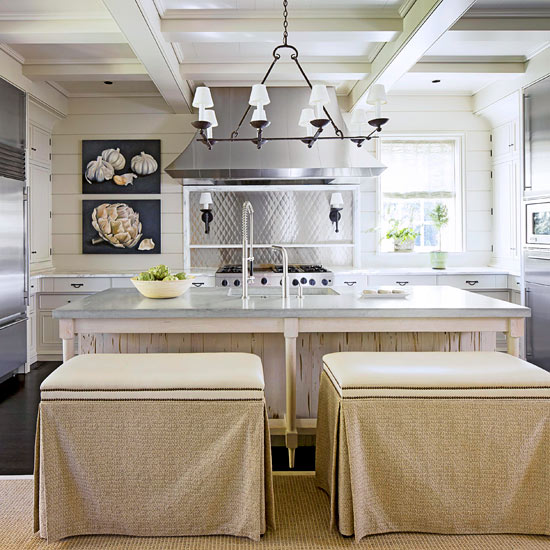 Concrete is an extremely durable and surprisingly versatile material that can be tinted and sculpted for maximum design possibilities. Concrete countertops complement other natural materials such as wood and stone.
Concrete is an extremely durable and surprisingly versatile material that can be tinted and sculpted for maximum design possibilities. Concrete countertops complement other natural materials such as wood and stone.
Pros:
– Heat and stain-resistant
– Durable
Cons:
– Must be sealed and regularly maintained to resist stains and water
– Susceptible to damage from highly acidic liquids
– Can be extremely heavy and require extra care
9. Tile Kitchen Countertops
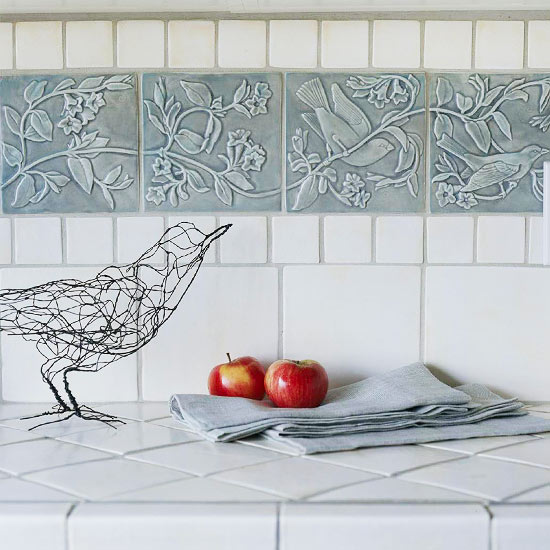 Tile provides a budget-friendly way to customize countertops. Ceramic tiles are durable and come in a variety of colours, shapes, textures, and sizes so that any style or look can be achieved.
Tile provides a budget-friendly way to customize countertops. Ceramic tiles are durable and come in a variety of colours, shapes, textures, and sizes so that any style or look can be achieved.
Pros:
– Budget-friendly
– Can be a do-it-yourself project
– Glazed ceramic tile is heat-, scratch-, stain-, and moisture-resistant
Cons:
– Tiles can chip or crack
– Although tiles might be resistant, grout is susceptible to stains and mildew, so it requires routine cleaning
Courtesy of Better Homes and Gardens
